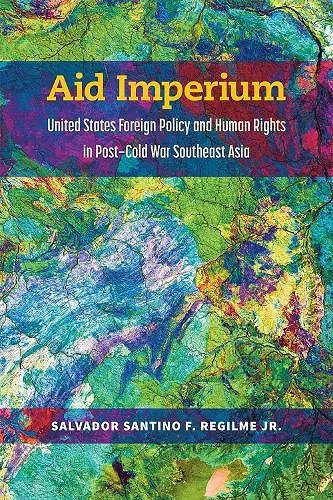Aid Imperium
United States Foreign Policy and Human Rights in Post-Cold War Southeast Asia
Salvador Santino Fulo Regilme, Jr author
Format:Hardback
Publisher:The University of Michigan Press
Published:3rd Nov '21
Should be back in stock very soon

Does foreign aid promote human rights? As the world’s largest aid donor, the United States has provided foreign assistance to more than 200 countries. Deploying global numerical data on US foreign aid and comparative historical analysis of America’s post–Cold War foreign policies in Southeast Asia, Aid Imperium provides the most comprehensive explanation that links US strategic assistance to physical integrity rights outcomes in recipient countries, particularly in ways that previous quantitative studies have systematically ignored. The book innovatively highlights the active political agency of Global South states and actors as they negotiate and chart their political trajectories with the United States as the core state of the international system. Drawing from theoretical insights in the humanities and the social sciences as well as a wide range of empirical documents, Aid Imperium is the first multidisciplinary study to explain how US foreign policy affects state repression and physical integrity rights outcomes in Southeast Asia and the rest of the Global South.
“In this clear-eyed and commendable study, Salvador Santino Fulo Regilme Jr. explores whether and how foreign aid can improve human rights outcomes—and sometimes sets them back. Theoretically rigorous, with illuminating case studies of US aid to Southeast Asia, this book opens a new era of debate on a crucial topic.”
—Samuel Moyn, author of Not Enough: Human Rights in an Unequal World
“Does US aid improve physical integrity rights in receiving countries? Through a masterly analysis of American ‘foreign strategic support’ in Thailand and the Philippines, Aid Imperium reintroduces politics to the picture, transforming aid recipients from passive players into key political actors for whom relations with the US and their own security imperatives plays a pivotal role in explaining the human rights impact of aid.”
—Stephen Hopgood, SOAS, University of London
“Does US foreign aid help or hurt human rights in recipient countries? Aid Imperium, with unique scholarly insight, systematic rigor and conceptual care, offers nuanced answers to this important question. This is a must-read for anyone interested in US foreign policy and human rights.”
—Julian Go, Professor of Sociology, the University of Chicago
“Salvador Santino Fulo Regilme Jr. has assembled hard data to support his interpretation of an ‘interest convergence theory’ that quantifies what he refers to as the ‘US Foreign Aid Imperium.’ His excellent reportage also brings the story forward to today’s headlines for readers unfamiliar with his two country cases.”
—Paul Rodell, Georgia Southern University
“Regilme makes it possible to explain why authoritarian regimes seem to continue getting more aid without necessarily changing their repressiveness and human rights record.”
—Obert Hodzi, University of Liverpool
"At a time when the fate of democracy is in question, this book is a must read. It explores the complex effects of U.S. foreign strategic support on human rights. With a laser focus on the Philippines and Thailand, it explains how and why certain types of leaders use this support to empower the state to foster the repression of their peoples."
—Emilie M. Hafner-Burton, Professor of Politics, School of Global Policy and Strategy, University of California, San Diego; author of Making Human Rights a Reality
"Aid Imperium is a must-read for those who seek deeper understanding of how foreign strategic assistance shapes physical integrity rights in the Global South. Regilme Jr offers a comprehensive and dynamic framework for how ideational factors shape the material consequences of foreign aid, and provides important insights into the conditions that facilitate domestic state repression and human rights abuse."
—Shannon Lindsey Blanton, University of Alabama at Birmingham
Aid Imperium offers compelling analysis of the ambiguous relationship between U.S. foreign support and domestic human rights abuses in Southeast Asia. Using cases from the Philippines and Thailand, S.S.F. Regilme teases out positive and negative causal relationships that other studies have failed to identify, integrating key factors from both international relations and domestic politics.
—Stephen Brown, Professor of Political Science, University of Ottawa
"Aid Imperium clearly demonstrates the complexity of US foreign strategic support in different contexts, and it offers well-considered insights into the main independent variables that impact on the human rights situation in recipient countries. This book will undoubtedly find a place among scholars, students and general readers interested in US foreign aid programmes and public diplomacy for years to come."
—LSE Review of Books
ISBN: 9780472132782
Dimensions: unknown
Weight: unknown
308 pages